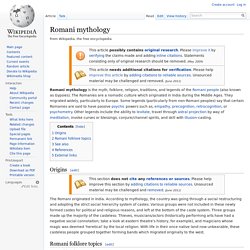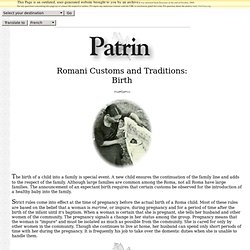

Romani mythology. Origins[edit] The Romani originated in India.

According to mythology, the country was going through a social restructuring and adopting the strict social hierarchy system of castes. Various groups were not included in these newly formed castes for political and religious reasons, and left at the bottom of the caste system. Three groups made up the majority of the casteless: Thieves, musicians/actors (historically performing arts have had a negative social connotation; take a look at eastern theatre's history, for example), and magicians whose magic was deemed 'heretical' by the local religion. With life in their once native land now unbearable, these casteless people grouped together forming bands which migrated originally to the west. Romani folklore topics[edit] See also[edit] References[edit] External links[edit] Gypsy Folk Tales by Francis Hindes Groome [1899], at Sacred Texts.comGypsy Sorcery and Fortune Telling by Charles Godfrey Leland [1891], at Sacred Texts.com.
Shrine Of Sainte Sara La Kali. There is a hushed silence, here in the Shrine of Sainte Sara la Kali, but that does not mean you are alone.

This place, revered by the Roma, is filled with the presence of those who have visited and those who have yet to arrive. Romani Rise boasts a replica of the genuine sanctuary of Black Sara, the original crypt being found in the Church at Saintes Maries de la Mer on the Ile de la Camargue, France, at the mouth of the Rhone River. Every year, thousands of Gypsies undertake a pilgrimage to Sainte Sara's crypt.
Until 1912, only the Rom had the right to enter the sacred haven, but now it is open to all. So, have no fear wanderer...you will not be subject to the evil-eye by setting foot upon this hallowed ground. To the left, as you enter, you will see an old altar...the pagan altar that some believe was once used to sacrifice bulls in the worship of Mithra, but this has never been proven. "One of our people who received the first Revelation was Sara the Kali. Romani mythology. The Patrin Web Journal - Birth Rituals. Romani Customs and Traditions:Birth The birth of a child into a family is special event.

A new child ensures the continuation of the family line and adds to the respect of the family. Although large families are common among the Roma, not all Roma have large families. The announcement of an expectant birth requires that certain customs be observed for the introduction of a healthy baby into the family. Roma People - Gypsies. Romani - Gypsies The Romani are an ethnic group living mostly in Europe and Americas.

Romani are widely known in the English-speaking world by the exonym "Gypsies" (or Gipsies) and also as Romany, Romanies, Romanis, Roma or Roms; in their Romani language they are known collectively as Romane or Rromane (depending on the dialect). Gipsy culture - their religion and beliefs. As of July 1, 2013 ThinkQuest has been discontinued.

We would like to thank everyone for being a part of the ThinkQuest global community: Students - For your limitless creativity and innovation, which inspires us all. Teachers - For your passion in guiding students on their quest. Partners - For your unwavering support and evangelism. Parents - For supporting the use of technology not only as an instrument of learning, but as a means of creating knowledge.
We encourage everyone to continue to “Think, Create and Collaborate,” unleashing the power of technology to teach, share, and inspire. Www.romawoman.org - English version. PNADM192.pdf (application/pdf Object) What Is a Gypsy? A Gypsy is a mystery and an image of freedom and creativity.

At least that's how Gypsies seem. In reality, a Gypsy is a member of a subculture with its own stringent rules and expectations, as well as its own way of life. The people known as Gypsies seldom call themselves that. In their own clans many refer to themselves as Roma. Roma - Introduction, Location, Language, Folklore, Religion, Major holidays, Rites of passage, Relationships, Living conditions. PRONUNCIATION: ROW-mah ALTERNATE NAMES: Gypsies; Vlach Roma; Rom; Romanichals; Cales; Kaale; Kawle; Sinti/Manouches LOCATION: Dispersed population in Europe; parts of Asia, North, Central and South America, Australia, New Zealand, North and South Africa, the Middle East, and elsewhere.

POPULATION: 6–10 million LANGUAGE: Romani dialects; also the language of the host country RELIGION: Hinduism with Christianity or Islam (host country religion) The Roma people originated in India. In the tenth century, a Muslim kingdom arose in what is now Afghanistan, with its capital at Ghasni. The ancestors of the Roma then left India and entered northwestern China. At some point during their migration from India, scholars believe their original name, Dom (or Domba in the plural), changed to Rom (singular) and Roma (plural). Since the fifteenth century, Roma have been a dispersed ethnic population in Europe.
English I am going into the village to buy a horse from the non-Roma man.